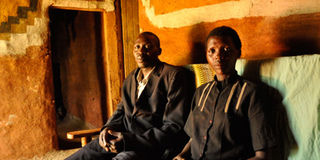She employs her husband

Violet Scovia Bushendech with her husband Francis in their home.
Under the midday sun, she chases ducks off her tarpaulin, spread in her compound. The ducks were pecking away at her maize seeds. Violet Scovia Bushendech knows better how much effort went into achieving a good harvest of maize after several poor yields.
To keep away the group of birds, she sends her seven-year-old son, Joshua, to bring her a stool so she can guard her cash crop.
“I have to make sure I don’t lose much because this is what I am banking on to pay school fees for my eight children,” she tells me through a translator, Francis Bushendech, her husband.
For the better part of the morning, she was seated at her shop, located about five kilometres in Chechabai town. Realising business was slow for the day, she returned home to take care of home affairs.
Starting out
She is a happy woman to have responsibilities which was not the case two years back when her husband thought she was better off staying at home. However, she needed to earn money that would enable her take care of home necessities.
“I also wanted my children to consistently go to school,” she adds. At some point, her husband wanted to leave her for another woman. Violet kept the conversation with her husband alive, to allow her work.
When she was given a go ahead, she did not waste the opportunity. She started trading in milk, using an initial capital of Shs30,000. She would move for four kilometres, to Kamiro village, where she would sell the milk.
“I would buy half a litre of milk at Shs500 and sells at Shs600, daily. In a week, I would make a profit of Shs30,000. On average, I would make Shs4,000. Of this, I would use Shs1,000 for household items like paraffin, sugar and salt and save Shs3,000,” she explains.
Progress report
She run the milk business for about six months during which she had saved about Shs400,000. From this, she put aside Shs100,000 to cater for her children’s school fees.
At the time, the 30-year-old trader and wife had started saving with Chechabai Village Saving Group which AT Uganda, an advocacy NGO for women empowerment, had helped set-up, and thereon taught locals how to save and invest.
With Shs300,000, she took out a loan to a tune of Shs260,000. “My dream was to start a retail shop and Shs560,000 helped me realise it. I bought sugar, salt, tea leaves, soap, juice (jolly juice) and sweets. Within the first month, I made a profit of Shs400,000 which encouraged me a lot. I got another idea,” she explains.
Her idea was to start buying maize and coffee in bulk, and selling it at a slightly higher price. She would buy a kilogramme of maize at Shs600 and sell at Shs700. She would buy a kilogramme of coffee Shs500 and sell at Shs700.
Her work
Violet plays more of a middleman role, buying from locals and selling to Sipi Project – Kawacom, project is based in Chema, near Kapchorwa town. From the weekly profits, she would pay back part of the loan. She would save Shs10, 000 on a weekly basis. There are 25 members in Chechabai Village Saving Group. 20 of these are women, and five men.
“I have been saving with the group for two years and my savings have grown to about Shs1.5m. I have bought land in the town where I run a retail shop and I am almost completing a commercial building in which I will house a bigger shop. I plan to expand my business,” Violet reveals.
Aware of the cash situation in her community, Violet accepts various modes of payment including cash and other marketable items like coffee berries, maize grain, beans and eggs.
She says her relationship with the husband has improved because she has taken over responsibilities of fending for the family. Her husband says he is happy with his wife’s empowerment.
The effects
“Previously I used to take care of everything. When the Community Based Facilitator (Cbf) from AT Uganda came to train us, I saw the relevance of giving my wife more freedom. We started drawing budgets together. We moved our children from UPE schools to private schools. I work in her shop nowadays,” Bushendech discloses.
In addition to sitting in his wife’s shop, Bushendech has grown coffee on two acres of land which fetches him approximately Shs4.2m in a good season. He says women empowerment is good because when women are given power, they are encouraged to work hard and build their skills.
“I advise fellow men to cooperate with their women to improve homes,” he adds. His wife is still on an ambitious streak. She has recently bought a cow at Shs1m, plus five sheep, each at Shs100,000.




